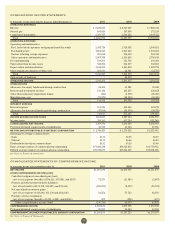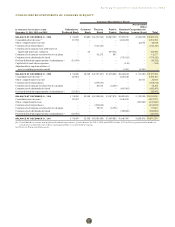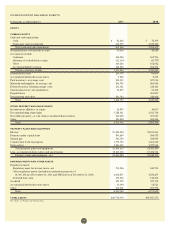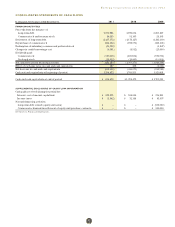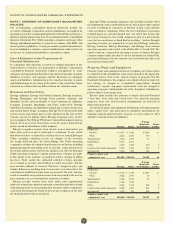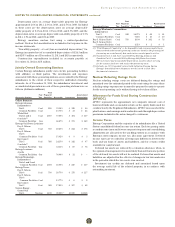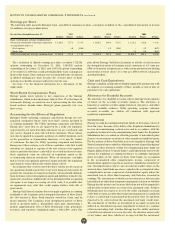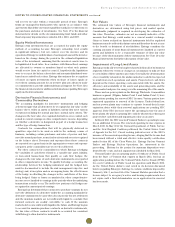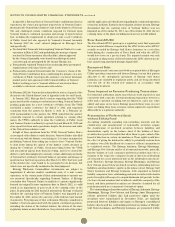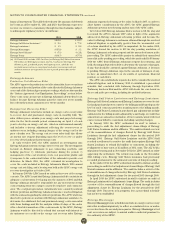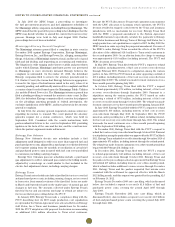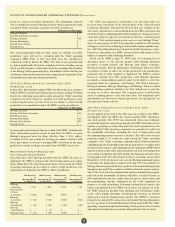Entergy 2011 Annual Report Download - page 68
Download and view the complete annual report
Please find page 68 of the 2011 Entergy annual report below. You can navigate through the pages in the report by either clicking on the pages listed below, or by using the keyword search tool below to find specific information within the annual report.
NOTES TO CONSOLIDATED FINANCIAL STATEMENTS continued
In April 2011, Entergy Nuclear Vermont Yankee and Entergy Nuclear
Operations, the owner and operator respectively of Vermont Yankee,
filed suit in the United States District Court for the District of Vermont.
The suit challenged certain conditions imposed by Vermont upon
Vermont Yankee’s continued operation and storage of spent nuclear
fuel, including the requirement to obtain not only a new Certificate
of Public Good, but also approval by Vermont’s General Assembly.
In January 2012 the court entered judgment in Entergy’s favor
and specifically:
n Declared that Vermont’s laws requiring Vermont Yankee to cease
operation in March 2012 and prohibiting the storage of spent
nuclear fuel from operation after that date, absent approval
by the General Assembly, were based on radiological safety
concerns and are preempted by the Atomic Energy Act;
n Permanently enjoined Vermont from enforcing these preempted
requirements of the state’s laws; and
n Permanently enjoined Vermont under the Commerce Clause of the
United States Constitution from conditioning the issuance of a new
Certificate of Public Good upon the existence of a below wholesale
market power sale agreement with Vermont utilities or Vermont
Yankee’s selling power to Vermont utilities at rates below those
available to wholesale customers in other states.
In February 2012 the Vermont defendants filed a notice of appeal of the
decision to the United States Court of Appeals for the Second Circuit.
In January 2012, Entergy filed a motion requesting that the VPSB
grant, based on the existing record in its proceeding, Vermont Yankee’s
pending application for a new Certificate of Public Good. The VPSB
scheduled a status conference for March 9, 2012, and requested
comments from the parties by March 2, 2012. In a February 23,
2012 memorandum to the parties, the VPSB asked that the parties’
comments respond to certain questions relating to, among other
issues, the VPSB’s authority to issue the Certificate of Public Good
and Vermont Yankee’s authority to operate beyond March 21, 2012 and
store spent fuel from such operations, despite the decision and order
of the United States district court.
In light of these questions from the VPSB, Vermont Yankee filed a
cross-appeal of the district court’s decision. Vermont Yankee also filed
two motions with the district court asking it (1) to issue an injunction
prohibiting Vermont from taking any action to force Vermont Yankee
to shut down during the appeal of the district court’s decision or
during the Certificate of Public Good proceeding before the VPSB
and any judicial appeal from that proceeding, and (2) to amend the
district court’s final judgment to include certain additional provisions
of Vermont law relating to Vermont Yankee’s operation and storage of
spent nuclear fuel from operation after March 21, 2012, that were part
of the statutes the court found to be preempted in its decision, but
which were not specifically included in the final judgment.
Entergy Wholesale Commodities’ investments are subject to
impairment if adverse market conditions arise, if a unit ceases
operation, or for certain units if their authorizations to operate are
not renewed. Specifically regarding Vermont Yankee, if Entergy
concludes that Vermont Yankee is unlikely to operate significantly
beyond its original license expiration date in March 2012, it could
result in an impairment of part or all of the carrying value of the
plant. In preparing its 2011 financial statements, Entergy evaluated
whether the carrying value of Vermont Yankee was impaired as of
December 31, 2011, before the outcome of the federal court lawsuit
was known. For purposes of that evaluation, Entergy considered a
number of factors associated with the plant’s continued operation,
including the status of the federal lawsuit, the status of the state
regulatory issues as described above, the potential sale of the plant,
and the application of federal laws regarding the continued operation
of nuclear facilities. Based on its evaluation of those factors, Entergy
determined that the carrying value of Vermont Yankee was not
impaired as of December 31, 2011. As of December 31, 2011 the net
carrying value of the plant, including nuclear fuel, is $465 million.
River Bend AFUDC
The River Bend AFUDC gross-up is a regulatory asset that represents
the incremental difference imputed by the LPSC between the AFUDC
actually recorded by Entergy Gulf States Louisiana on a net-of-tax
basis during the construction of River Bend and what the AFUDC
would have been on a pre-tax basis. The imputed amount was only
calculated on that portion of River Bend that the LPSC allowed in rate
base and is being amortized through August 2025.
Reacquired Debt
The premiums and costs associated with reacquired debt of Entergy’s
Utility operating companies and System Energy (except that portion
allocable to the deregulated operations of Entergy Gulf States
Louisiana) are included in regulatory assets and are being amortized
over the life of the related new issuances, in accordance with
ratemaking treatment.
Taxes Imposed on Revenue-Producing Transactions
Governmental authorities assess taxes that are both imposed on and
concurrent with a specific revenue-producing transaction between a
seller and a customer, including, but not limited to, sales, use, value
added, and some excise taxes. Entergy presents these taxes on a net
basis, excluding them from revenues, unless required to report them
differently by a regulatory authority.
Presentation of Preferred Stock
without Sinking Fund
Accounting standards regarding non-controlling interests and the
classification and measurement of redeemable securities require
the classification of preferred securities between liabilities and
shareholders’ equity on the balance sheet if the holders of those
securities have protective rights that allow them to gain control of the
board of directors in certain circumstances. These rights would have
the effect of giving the holders the ability to potentially redeem their
securities, even if the likelihood of occurrence of these circumstances
is considered remote. The Entergy Arkansas, Entergy Mississippi,
and Entergy New Orleans articles of incorporation provide, generally,
that the holders of each company’s preferred securities may elect a
majority of the respective company’s board of directors if dividends
are not paid for a year, until such time as the dividends in arrears are
paid. Therefore, Entergy Arkansas, Entergy Mississippi, and Entergy
New Orleans present their preferred securities outstanding between
liabilities and shareholders’ equity on the balance sheet. Entergy Gulf
States Louisiana and Entergy Louisiana, both organized as limited
liability companies, have outstanding preferred securities with similar
protective rights with respect to unpaid dividends, but provide for the
election of board members that would not constitute a majority of the
board; and their preferred securities are therefore classified for all
periods presented as a component of members’ equity.
The outstanding preferred securities of Entergy Arkansas, Entergy
Mississippi, Entergy New Orleans, and Entergy Asset Management
(whose preferred holders also had protective rights until the
securities were repurchased in December 2011), are similarly
presented between liabilities and equity on Entergy’s consolidated
balance sheets and the outstanding preferred securities of Entergy
Gulf States Louisiana and Entergy Louisiana are presented within
66


